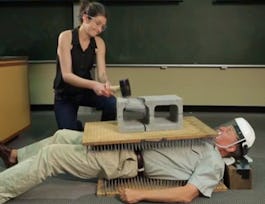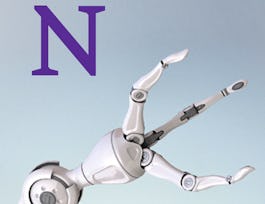This course is an advanced study of bodies in motion as applied to engineering systems and structures. We will study the dynamics of rigid bodies in 3D motion. This will consist of both the kinematics and kinetics of motion. Kinematics deals with the geometrical aspects of motion describing position, velocity, and acceleration, all as a function of time. Kinetics is the study of forces acting on these bodies and how it affects their motion.



Advanced Engineering Systems in Motion: Dynamics of Three Dimensional (3D) Motion

Instructor: Dr. Wayne Whiteman, PE
Sponsored by ITC-Infotech
36,077 already enrolled
(310 reviews)
Details to know

Add to your LinkedIn profile
6 assignments
See how employees at top companies are mastering in-demand skills


Earn a career certificate
Add this credential to your LinkedIn profile, resume, or CV
Share it on social media and in your performance review

There are 6 modules in this course
In this section students will learn to derive the "derivative formula." We will define angular velocity for 3D motion and learn to determine and solve for the Angular Acceleration for a body.
What's included
6 videos13 readings1 assignment
In this section students will learn about velocities in moving reference frames, accelerations in moving reference frames, and the Earth as a moving frame.
What's included
6 videos11 readings1 assignment
In this section students will learn about Eulerian Angles rotation matrices, angular momentum in 3D, and intertial properties of 3D bodies.
What's included
8 videos10 readings1 assignment
In this section students will learn about translational and rotational transformations of inertial properties, and principal axes and principal moments of inertia.
What's included
6 videos9 readings1 assignment
In this section students will learn to develop Euler Equations for 3d motion and solve for the motion of a rigid body undergoing 3D rotational motion.
What's included
5 videos8 readings1 assignment
In this section students will learn to develop and apply the principle of impulse-momentum and about 3D work-energy principles.
What's included
4 videos8 readings1 assignment
Instructor

Offered by
Why people choose Coursera for their career




Learner reviews
310 reviews
- 5 stars
85.16%
- 4 stars
12.58%
- 3 stars
1.93%
- 2 stars
0%
- 1 star
0.32%
Showing 3 of 310
Reviewed on Feb 14, 2023
Thank you very much for the topics attended in this course. This helped me to understand a dynamic class in college.
Reviewed on Sep 11, 2019
Excellence course to get real time practically problems solving with enjoyment and easily quick understand.
Reviewed on Jun 8, 2017
It was a great course and lecturer. I learned a lot. The best part of the course is that it shows the fundamentals and that leads us to solve the more complex problems.
Recommended if you're interested in Physical Science and Engineering

UNSW Sydney (The University of New South Wales)

Georgia Institute of Technology

Northwestern University

ISAE-SUPAERO

Open new doors with Coursera Plus
Unlimited access to 10,000+ world-class courses, hands-on projects, and job-ready certificate programs - all included in your subscription
Advance your career with an online degree
Earn a degree from world-class universities - 100% online
Join over 3,400 global companies that choose Coursera for Business
Upskill your employees to excel in the digital economy


